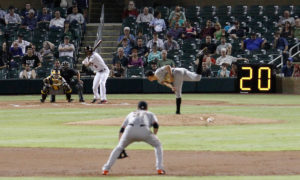The 5 Times the Pitch Clock will Matter

The pitch clock is coming to Major League Baseball, whether the players like it or not. For some reason, the MLBPA and the commissioner’s office are negotiating a deal to install the pitch clock, even though Rob Manfred has unilateral authority to implement it for next season.
Sources: Players’ union formally rejected MLB’s pace-of-play proposal today. Manfred, who has power to unilaterally implement pitch clock, not giving up making an agreement.
— Ken Rosenthal (@Ken_Rosenthal) January 18, 2018
Maybe this is just an attempt to divert the MLBPA’s attention away from all the unsigned free agents. Whatever the reason, baseball is no longer an untimed sport. Aside from right now, there are exactly 5 times the pitch clock will be a story in 2018.
1. Beginning of Spring Training
It’s hard to believe, but in about 5 weeks there will actually be a real baseball game (Editor’s Note: wooooo!), or at least as real as Spring Training games can be. In the pre and postgame interviews with managers and pitchers, every team’s beat writer will ask a question about the pitch clock. Most will give a boring formulaic answer- let’s face it, athlete interviews are often insufferable- and then move on to questions about the shoulder, the breaking ball, the command, etc. Then, after maybe 2 or 3 games, we won’t hear about the pitch clock again for another month or so.
2. Opening Day
In many ways, this will be a repeat of the above. During Spring Training, everything feels important and meaningful. Then the regular season begins, and we instantly forget that they’ve been playing baseball for more than a month already. The interview questions will go something like this:
REPORTER: How did the pitch clock impact you today? Was it on your mind while you were pitching?
PITCHER: We had the pitch clock for all of Spring Training, so I’m pretty used to it now. It’s not a big deal.
3. The First Automatic Ball
Did you know Ron Blomberg was the first DH to bat in a regular season game? Or that Lee Richmond threw the first perfect game? Lou Gehrig had the first 4 HR game in 1932. Mickey Mantle hit the first indoor home run in the Astrodome during an exhibition game.
We, the members of the baseball community, LOVE trivia, especially firsts. When something happens for the first time, we just go berserk. The first time an automatic ball is called, the announcers will inevitably declare that the moment shall go down in history. They might even send game mementos to the Hall of Fame. There will be much ballyhoo and rejoicing. Then, 20 seconds later, the pitcher will throw the next pitch.
4. The First Automatic Walk
Pitchers tend work slower with men on base, so there’s a good chance the first automatic walk will exacerbate a jam. This will be the first time players and managers actually display a strong opinion on the subject (other than those that have already done so). Twitter and the TV networks will flood with hot takes from analysts; some will say it’s great and others will hate it. No one will be in the middle, or at least no one getting air time. Then, a day or two later, something else will capture the headlines and the pitch clock will fade back into irrelevance.
5. The First Ejection
Much like drivers yelling at traffic signals, some managers will choose to argue the inarguable. Whether or not they like the pitch clock, it is now one of the most clear cut decisions an umpire can make. When time expires they have to call a ball. Sooner or later, a pitcher or manager will argue this point, going far enough to warrant removal from the game. Once again, the media will have the pleasure of debating the fairness and ramifications of the pitch clock, and then the news cycle will turn over shortly thereafter.
That’s it. Outside of these five occurrences, no one will care about the pitch clock. Baseball will remain almost exactly as it was the year before. Once we get this out of our system, we can find something new to blow out of proportion.
-Daniel R. Epstein
















